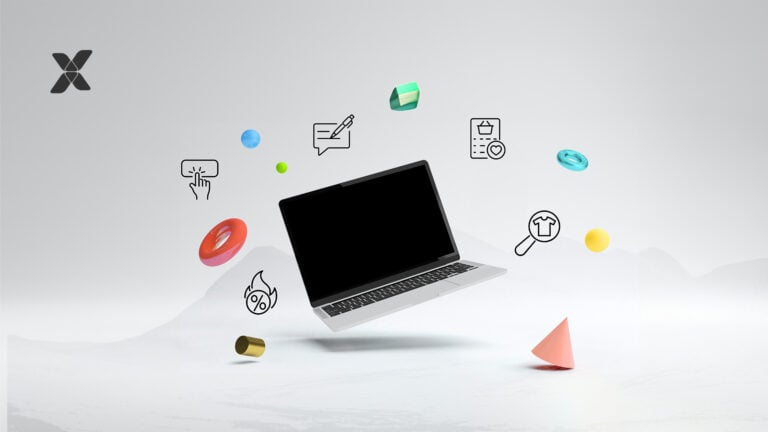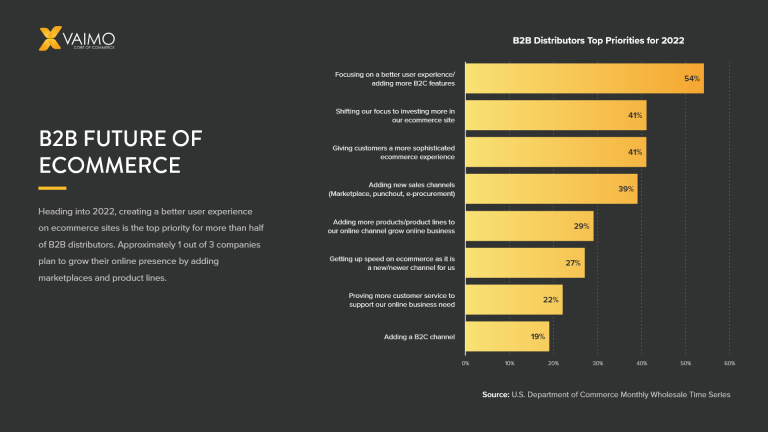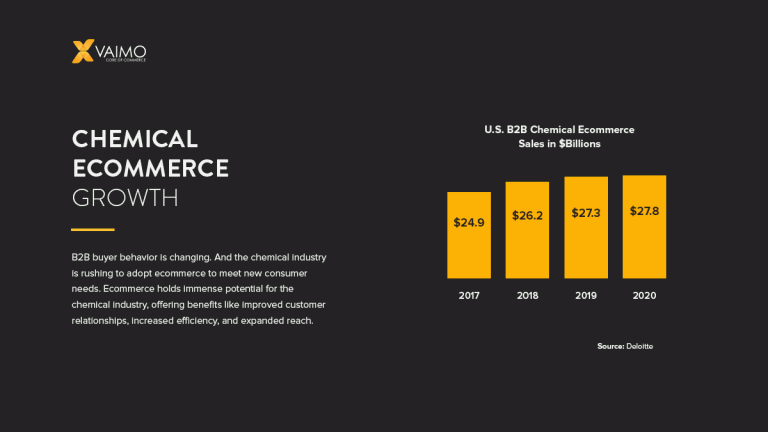Ecommerce opens up a wide range of new opportunities for manufacturers across all sectors and industries. B2C ecommerce has already changed the retail landscape entirely, and early adopters in B2B manufacturing ecommerce are now gaining significant competitive advantages.
TABLE OF CONTENTS
-
- The B2B Buyer Journey has Changed
- A Digital Buyer Journey Creates Resilience
- B2B Buyers Expect Personalization and Digital Features
- 10 Benefits of Ecommerce for B2B Manufacturers
- 1. Higher Profit Margins
- 2. Stronger Customer Relationships
- 3. Access to 1st Party Customer Data
- 4. Ownership of Brand Representation
- 5. Increased Brand Awareness
- 6. Control Over Pricing and Discount Strategies
- 7. Increased Personalization
- 8. Opportunities to Innovate
- 9. Improved Scalability
- 10. More Efficient Operations
- How Vaimo Can Help
The B2B Buyer Journey has Changed
In response to the significant supply chain disruptions and widespread uncertainty caused by the global pandemic, manufacturers are looking for leaner ways of operating, procuring, and purchasing supplies. But above all, the industry has seen a substantial increase in digital commerce.
Today, manufacturer commerce is a somewhat strange mix of non-linear, online, and offline touchpoints spanning different assets and verticals. A fully digital ecommerce approach can help manufacturers streamline their operations, boost sales, and increase revenue.
An ecommerce website can facilitate those scattered journeys and improve the buying experience, providing buyers with the critical information they need at each phase to proceed to the next step. Those who manage to decode the customer journeys within their niche and create coherent digital experiences will increase their market share.
Related reading: Omnichannel B2B Ecommerce – the New Normal
A Digital Buyer Journey Creates Resilience
Studies show that manufacturers with a higher level of digital maturity before the pandemic displayed greater resilience than companies with low digital maturity. This was also true for the manufacturers who invested in increased digitalization during the pandemic.
Before the Covid19 pandemic, a report from eMarketer found that only around 9% of total B2B U.S. product sales occurred through an ecommerce website. But this is changing quickly, and the pandemic accelerated the change. Forrester predicts that by 2023, as much as 17% of total U.S. B2B transactions will happen via ecommerce, reaching a staggering $1.8 trillion. And this is only the beginning, as this trend is bound to keep accelerating.
Related reading: How to Mitigate D2C Channel Conflict
B2B Buyers Expect Personalization and Digital Features
There are many reasons B2B buyers prefer a digital buying journey. First, B2B buyers are people, and people, in general, are increasingly moving online to manage product research and purchases. We are creatures of habit, and the digital habits we’ve all built in our personal lives spill over into our professional behaviors.
This change in customer behavior is clearly shown in many studies and reports. When U.S. B2B buyers were asked what the most important aspects of online purchasing are, 51% said it’s the ability to get customized products, 32% said it’s the easy checkout, and 27% the ease of finding and selecting products. Additionally, 45% of B2B buyers want and expect personalized portal content, 44% appreciate an easy-to-use ROI calculator, 38% look for AR functionality, and 33% expect video chat options.
To learn more about creating genuinely outstanding B2B customer experiences, download our guide: Building a Better B2B Customer Experience. There you’ll find a step-by-step guide to a better B2B customer experience and an overview of current trends and customer expectations.
10 Benefits of Ecommerce for B2B Manufacturers
The advantages of D2C business models are well known among B2C brands. But there are also many benefits for the B2B manufacturers selling through an ecommerce website instead of via distributors. Let’s have a look at a few of these advantages.
1. Higher Profit Margins
By cutting out the middleman, manufacturing ecommerce can significantly increase the profit margins. This can be leveraged in different ways, allowing manufacturers to run more attractive campaigns and compete on price if they wish to do so.
2. Stronger Customer Relationships
A direct relationship with the customers, instead of dealing with them through distributors, allows B2B brands to build and nourish stronger customer relationships. This is the foundation for building predictable recurring revenue and identifying and leveraging upselling and cross-selling opportunities.
3. Access to 1st Party Customer Data
As the access to 3d and 2d party data keeps getting increasingly restricted, 1st party data on customer information and behavior becomes increasingly valuable. This data can be collected via an ecommerce site, while it is entirely lost if the customer interactions occur via distributors.
Related Reading: Digital Experience Strategy: Customer Data in B2B Ecommerce
4. Ownership of Brand Representation
When selling via a 3rd party platform or distributor, brands have little control over how their products and brands are positioned and presented. On the other hand, when selling on a proprietary ecommerce website, brands have complete control over everything from visual branding to storytelling and how the customer journey is designed and optimized.
5. Increased Brand Awareness
According to research from Google, 58% of B2B manufacturer buyers begin their research online with a product, then follow up with a brand search. Vendors can SEO-optimize their ecommerce websites to receive traffic for both types of queries—product and brand-name ones—enabling more buyers to learn about their brand and full product range.
6. Control Over Pricing and Discount Strategies
When implementing a D2C business model, B2B brands get control over the whole customer experience, including the pricing aspect. This allows brands to be more agile and to use price more strategically. Whether by launching timely campaigns or by identifying market gaps and leveraging them, complete control and increased margins allow for greater flexibility.
7. Increased Personalization
With access to customer data and direct customer contact, B2B brands can create greater personalization and customization. This, in turn, creates better customer experiences and increases customer loyalty. Not only is this true in the buying journey, but it also positively affects marketing and nurturing strategies.
8. Opportunities to Innovate
Interacting directly with customers and catering to their needs provides valuable insights into what those needs actually look like. This knowledge that can be assembled qualitatively and through automated data collection on your ecommerce website can help drive innovation. Knowing more about what your buyers value in their suppliers allows you to develop unique value propositions.
9. Improved Scalability
One key benefit of digital sales is the increased scalability that comes with this model. Ecommerce is more scalable as it requires less physical commitment. A more digital approach significantly increases B2B manufacturers’ ability to process orders without needing more distributors or hiring extra sales reps. And since orders are processed digitally, buying efficiency and effectiveness can be improved.
10. More Efficient Operations
Ecommerce platforms allow for the automation of time-consuming manual tasks and processes, such as billing, checkout, and inventory management. This means companies can instead devote time and resources to their core business activities, such as marketing and customer support.
Related reading: The Future of B2B Ecommerce
How Vaimo Can Help
The field of B2B ecommerce is constantly changing and evolving. New platforms emerge, new tools offer new capabilities, and the search algorithm updates keep sending digital marketers new curveballs. As a results, many B2B companies struggle to keep up with and risk lagging behind.
Partnering with a team of B2B ecommerce experts will help you tackle these challenges. To run a successful B2B ecommerce business, you need a clear and defined strategy, the right resources and expertise, custom programming and development, and consistent and careful planning.
At Vaimo, we can help with all of the above. Almost anything is possible if you hire the right experts, and we’re happy to help you bring your ecommerce vision to life. Even if you’ve been told elsewhere a particular functionality is not possible to develop, it’s worth getting a second opinion – at Vaimo we love a good challenge.
We have extensive experience in all things ecommerce, and we understand the complexities of B2B sales. Reach out today for a consultation on how we can help you grow and scale your B2B business.







